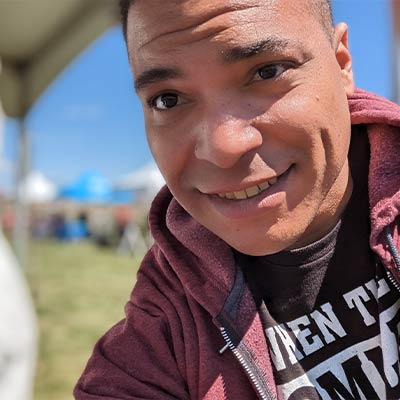Courses & Requirements
MA in Clinical Mental Health Counseling, Somatic Counseling: Dance/Movement Theories & Practice Concentration
Approved by the American Dance Therapy Association since 1987, the Somatic Counseling: Dance/Movement Theories & Practice concentration focuses on counseling, the healing potential of the creative experience, and the therapeutic properties of conscious movement sequencing. Students in the Somatic Counseling: Dance/Movement Theories & Practice concentration are trained in both classical and innovative forms of dance/movement therapy, as well as object relations and self-psychology, the Gestalt-based Moving Cycle, Authentic Movement, and current models of sensorimotor tracking. Woven throughout the curriculum is a focus on inclusivity and the way that one’s particular socio-cultural locations influence the body, expression, and the therapeutic relationship. Dance/Movement Theories & Practice students are invited to dive deeply into the creative process using the tools of imagery, improvisation, rhythm, spontaneity, metaphor, and presence to activate expressivity and aliveness in themselves, and thereby in those with whom they will ultimately work.
American Dance Therapy Association
The Somatic Counseling: Dance/Movement Theories & Practice concentration is designed in accordance with the training guidelines of the American Dance Therapy Association (ADTA) and has been an ADTA-approved program since 1987. The Dance/Movement Theories & Practice concentration fulfills the requirements for the ADTA’s initial registration as a Registered Dance Movement Therapist (R-DMT). Graduates may apply for the R-DMT credential with the ADTA immediately upon degree completion.
International Somatic Movement Education and Therapy Association
It is possible for a student graduating from the Somatic Counseling Department to use coursework to fulfill the requirements for the International Somatic Movement Education and Therapy Association’s (ISMETA) certification as a Registered Somatic Movement Therapist (RSMT) and/or Registered Somatic Movement Educator (RSME).
Degree Requirements*
*Pending final approval by the Higher Learning Commission. Course offerings and sequencing are subject to change.
Semester 1 (Fall, Year 1)
- CMHC 600, Foundations and Orientation of Clinical Mental Health Counseling (3)
- CMHC 601, Social/Multicultural Foundations (3)
- CNSD 617, Foundations of Dance Movement Therapy in Counseling (2)
- CNSS 646, Contemplative Practices for Somatic Counseling I (1)
Subtotal 9
Semester 2 (Spring, Year 1)
- CMHC 603, Counseling and Helping Relationships I (3)
- CMHC 602, Human Growth and Development (3)
- CNSS 658, Applied Anatomy and Neuroscience in Counseling (2)
- CNSS 622, Body/Movement Observation/Assessment (3)
Subtotal 11
Summer Year 1
- Off
Subtotal 0
Semester 3 (Fall, Year 2)
- CMHC 604, Counseling and Helping Relationships II (3)
- CMHC 605, Group Counseling (3)
- CMHC 606, Legal and Ethical Aspects of Counseling (3)
- CNSD 716, Specialized Approaches in Dance/Movement Therapy in Counseling (2)
Subtotal 11
Semester 4 (Spring, Y2)
- CNSS 663, Family Systems (3)
- CNSS 606, Advanced Counseling Skills (3)
- CMHC 607, Diagnosis and Treatment Planning (3)
- CMHC 620, Counseling Practicum (3)
Subtotal 12
Semester 5 (Summer, Year 2)
- CMHC 609, Research & Program Evaluation (3)
- CMHC 608, Assessment (3)
- CNSD 621, Extended Practicum (Dance/Movement Approaches in Counseling) (1)
Subtotal 7
Semester 6 (Fall, Year 3)
- CMHC 622, Internship I (3)
- CNSS 664, Crisis, Trauma, and Distaster Counseling (3)
- CMHC 615, Capstone I (1)
Subtotal 7
- CMHC 623, Winter Intercession Internship (0)
Semester 7 (Spring, Year 3)
- CMHC 624, Internship II (3)
- CMHC 610, Career Development (3)
- CMHC 616, Capstone II (1)
Subtotal 7
Total Credits: 64

Connect
with your counselor
Jeffrey Neering
Graduate Admissions Counselor



